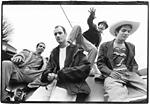WHATEVER THEIR PATHS before, music and technology locked into their courses during the last year, and the two worlds will soon collide. The effect of the Next Big Bang remains undetermined, but it’s already evident that the creeping convergence of these industries is changing the way we listen to and experience music.
Seattle tech companies like RealNetworks, Amazon.com, and Microsoft bet on music and won in ’99, and in the process sent shock waves through the $15 billion record industry. Around the country, start-ups continue to bloom, offering to bounce songs off of satellites, stream them through phone or cable lines, or send them into pen-sized devices that will play them back with CD-like quality.
Seattle Weekly caught up with three local start-ups that either just launched or will go live in coming weeks, and like their established counterparts they’re bent on having a say in the future of music.
World Wide Broadcasting
Format: Internet radio, with plans for video and more
Projected launch date: December 15
College friends Joel Feldman and Josh Buckley’s Central District house looks and sounds like a typical post-academic guys’ pad. Unframed posters of rock stars and models adorn the walls, a beer-stocked fridge wrestles for space in the kitchen with a giant wire spool-cum-table, and the stereo blares music continually.
But Joel and Josh’s unassuming house doubles as the launching pad for their Internet start-up, World Wide Broadcasting, an Internet radio company that will go live with 26 channels December 15. Joel, 23, and Josh, 26, emphasize that they’re not confining themselves to becoming yet another streaming Webcaster.
“We are unlimited,” Joel says. “We’re not World Wide radio, we’re World Wide Broadcasting.”
In another age, maybe even three years ago, these guys would hold down jobs in record stores or restaurants or the office of a friend of their dad. Now, with an idea and some seed money, anybody can be an entrepreneur. The rash of lucrative music-related IPOs in the past year—MP3.com, Liquid Audio, Emusic—makes the risk all the more alluring, which is why Joel and Josh migrated almost immediately from the college classroom to the digital playing field.
There are technological obstacles. “There’s no book on how to start an Internet radio station,” Josh says. Along with Joel’s brother Scott, the World Wide Broadcasting crew has spent the last few months working from its own textbook, planting its logo—a variation on a stereo’s play button—around Seattle and encoding songs from a record collection that spans alt-country, funk, garage-rock, jam bands, and soul. Aware that they’re entering a crowded field, the team plans to roll out its new site with fresh ideas, an open mind, and a slogan: “Two clicks to the music.”
The most notable feature of the planned site is an all-Seattle channel, allowing WWB to sidestep the criticism that Internet radio’s global aspect comes at the expense of local programming; they plan on setting up channels for other cities as well.
They’re cagey on the topic of how the company will interact with music outside the radio format, but Joel’s confident that he’s got winning ideas up his sleeve. “Radio was a starting point,” he says. “Right now, the technology is limited, but I see where it is going. We have to understand the technology and how it’s going to morph us. The Internet’s not always going to be on that box.”
The Dial
www.thedial.com (programming accessible at www.salon.com, www.women.com, and www.sportingnews.com)
Format: Personalized audio content for partners, a variation of Internet radio
Launched: October 1999
Visitors to the Dial’s offices in the former home of radio station KXR aren’t greeted by a smiling secretary but by a plush gorilla with a sign around its neck: “Start-ups should not have receptionists.” The stuffed ape doesn’t have an answer about whether a new company should occupy a sprawling space with breathtaking views of Elliott Bay, but a meeting with founder Todd Herman quickly clears the air—this is not your usual start-up.
Though Herman and some of the Dial’s 23 other employees come from a radio background and are eager to embrace new technology, they’re dead set against creating another Internet radio station. Instead, they’ve concocted an unorthodox mix of music programming and sketch comedy; they also embed 15-second ads into the streams. Further, the 10 channels aren’t accessible on thedial.com, but on high-profile partner sites—like Salon, Women.com, and the Sporting News’ online venture—that feature programming aimed at specific listeners; for instance, Salon’s Dial includes spoken recitations of content from the Web publication’s site.
Users who click on the Dial can link to information on artists, songs, products or features affiliated with the host sites. At a time when many industry insiders predict that music will take on new dynamics, this interactive formula seems intriguing.
“Our vision is that it’s not just the content you hear,” says the 30-year-old Herman, “it’s the content that’s out there.”
Bootleg TV
Format: Live concert streaming, audio and video
Launch date: Late January
Working closely with the ever-evolving band King Crimson, David Singleton noticed that fans were just as interested in the live shows as the records. The realization meshed with his theory that recordings limit listeners to static product, while music has the capability to transform so that one need not hear the exact same song twice.
“Our view is that people will get closer to the performance than to the product,” Singleton says.
This nascent philosophy, coupled with the financial realities that sales of bootleg recordings hurt his boss Robert Fripp’s bottom line, led Singleton to conceive BootlegTV.
The company, with offices in Seattle, England, and Los Angeles, has already begun a gradual launch, offering a streamed King Crimson concert. Eventually, BootlegTV will attempt to satisfy the appetite of even the hungriest music fan, offering audio and visual channels for a variety of artists as well as the chance to purchase CDs, tickets, downloads, and merchandise; even practice sessions and impromptu jams may become available.
The live music model has typically been confined to the streaming of concerts, and Singleton’s aiming to expand this to its limits, not only to benefit his company, but to generate more revenue for artists while bringing them closer to fans. In the end, he suggests, this type of site could change not only how users interact with music, but how artists create the music as well.
“It’s hard to predict how it’ll affect the way people listen to music,” Singleton says. “It’ll be interesting how it influences musical trends.”






